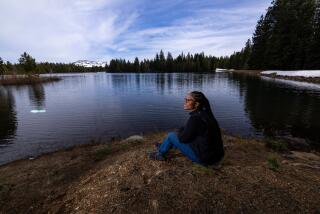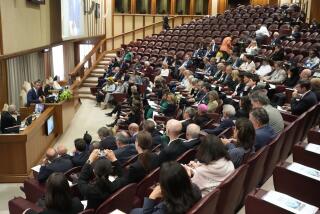Interfaith Project Aims to Protect Environment : Policy: Gore helps to launch partnership of Catholic, Jewish and Protestant leaders. Grass-roots activity in thousands of congregations is among goals.
- Share via
WASHINGTON — Vice President Al Gore, formally launching an interfaith effort to make environmental concerns more central to the nation’s religious bodies, said the project was “truly the beginning of something we will look back on years from now as a landmark.”
Gore, at a news conference and briefing in the Old Executive Office Building on the White House grounds this week, told leaders of the new National Religious Partnership for the Environment that the initiative “will trigger the beginning of grass-roots activity in tens of thousands of religious congregations across the country.”
He spoke to the Roman Catholic, Jewish, mainline and evangelical Protestant leadership of the partnership and some 75 religious activists deeply involved in relating faith and environmental concerns.
The partnership, which has been forming over two years, brings together the National Council of Churches, U.S. Catholic Conference, Consultation on the Environment and Jewish Life, and the Evangelical Environmental Network in an ambitious project to place issues of environmental justice at the heart of the nation’s religious life.
Leaders of the partnership, including Dean James P. Morton of the Episcopal Cathedral of St. John the Divine in New York City, praised Gore for the role he played in bringing the partnership to life.
The environment, Morton said, “is not just another issue but an inescapable challenge to what it means to be religious.”
Chancellor Ismar Schorsch of the Jewish Theological Seminary of America praised the Clinton and Gore Administration for what he said is its “struggle to find a place for religion in the public square,” noting the White House forum in which the group could “offer religious perspectives to a global threat--the environmental degradation of the planet.”
Catholic Bishop James Malone of Youngstown, Ohio, a former president of the National Conference of Catholic Bishops, said Catholics look at the partnership as providing “a critical contribution to bring together the struggle for justice with the protection of the environment.”
“We bring together our defense of the poor with our care of the Earth,” he said.
The Rev. Joan Brown Campbell, general secretary of the NCC, joined by the Rev. W. Franklyn Richardson, general secretary of the National Baptist Convention, noted that environmental issues have often been viewed as “elitist.”
“The gift we bring to this partnership is the diversity of our membership,” she said. “It is significant that our inaugural event will be a summit of black church leaders.”
Evangelicals are also strongly represented in the partnership, marking something of a breakthrough in relations between Protestants often on opposite sides of public issues.
Among those attending the briefing and the daylong series of events were representatives of the National Assn. of Evangelicals; World Vision, a relief organization; Sojourners, an evangelical social action group; the Inter-Varsity Christian Fellowship, a campus-based Christian student movement, and the AuSable Institute, an evangelical environmental group. The day began with a breakfast meeting and worship service launching the effort.
David McKenna, president of Asbury Theological Seminary in Wilmore, Ky., said evangelicals would be “full partners in the partnership and are ready to mobilize a previously unheard-from constituency.”
The three-year, $4.5-million project will undertake a host of programs, tailored to the individual faith groups but focused on educating and “greening” 53,000 congregations.
It will also engage in public policy advocacy on issues on which there is agreement.
Carl Sagan, director of the Laboratory for Planetary Studies at Cornell University and one of the nation’s best-known scientists, hailed the new initiative as unprecedented and especially praised the religious community for establishing a science office within the partnership.
It has established a consultative relationship with the Union of Concerned Scientists and will continue its conversations with scientists such as Stephen Jay Gould, Nobel laureate Dr. Henry Kendall and Sagan.
Calling the new relationship between science and religion “an extraordinary departure,” Sagan said that separately neither science nor religion can solve the problem of “redeeming the environment from the shortsightedness of the last few generations.”
More to Read
Sign up for Essential California
The most important California stories and recommendations in your inbox every morning.
You may occasionally receive promotional content from the Los Angeles Times.













